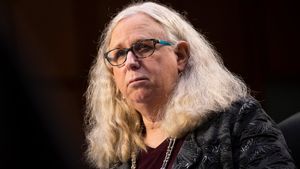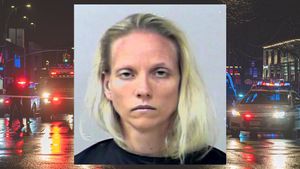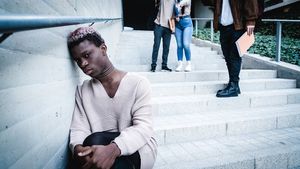Before it became Blink Twice, Zoë Kravitz’ directorial debut was known as “P*ssy Island.” A not-so-subtle nod to Epstein Island to be sure, but Kravitz decided to go another way. Starring some of our most congenial faves like Channing Tatum, Haley Joel Osment, Christian Slater, Kyle MacLachlan and even newcomer Leon Hawke, Blink Twice is a startling cautionary tale about the evil that can lay in men’s minds and the blindness that women can develop to it.
The project was co-written with her High Fidelity collaborator, E.T. Feigenbaum. Though sadly short-lived, High Fidelity was beloved by many and forged a connection that would lead to Kravitz’ first feature-length screenplay and directing project.
The wonderful Naomi Ackie stars as our protagonist Frida alongside bestie Jess (Alia Shawkat). The two are cater-waiters at a posh event where Frida, literally and figuratively, runs into the elusive Slater King (Tatum). After some innocent flirting, Frida is invited by Slater to accompany him on an island getaway with a few of his closest friends. This is where we meet Camilla (Liz Caribel), Tom (Osment), Lucas (Hawke), Sarah (Adria Arjona), Cody (Simon Rex), Vic (Slater), and Rich (MacLachlan). We’re also introduced to Stacy, played frighteningly well by feminist icon Geena Davis.
The sun soaked days go by and seem to blend into one another as the group, in a haze of narcotics and liquor, quickly give into “island time” and forget their cares. All is well until one day Jess disappears, and no one can quite seem to remember she was ever really there.
It’s a slow burn of a film, but one with a conclusion that’s as mystifying as it is satisfactory. Out had the pleasure of speaking with Kravitz about the themes in the film, the casting, that ending, and can we ever really be equal?
 Channing Tatum and Zoë Kravitz behind the scenes of 'Blink Twice'Courtesy of Amazon MGM Studios
Channing Tatum and Zoë Kravitz behind the scenes of 'Blink Twice'Courtesy of Amazon MGM Studios
Out: I feel like it was planned tohave Channing play Gambit in Deadpool & Wolverine after this. I think a lot of his fans needed to see him in that role after his dark performance in this film.
Zoë Kravitz: I know, I know! I was actually telling him earlier how he was having the craziest summer with so many different roles. From Fly Me to the Moon, which is just a lovely, sweet, romantic comedy. Then to Gambit and then to this. He’s really showing his range this summer.
We love to see it! Thankfully I saw Blink Twice before Deadpool & Wolverine so I could have a palate cleanser.
That’s how they should play it in the theater. Everyone should see Blink Twice and then Deadpool & Wolverine right after.
A double feature, though viewers may need some time. Blink Twice was absolutely harrowing in the best and worst possible ways.
Yes, yes, thank you, and yes!
It sticks with you and I just have not been able to stop thinking about it. I came prepared with so many things to discuss and ask about and all I can think of to say is, “Zoey… girl!”
That really is it, and my response to you would be, “Girl.”
I feel like that’s enough, but maybe there’s some people that want a little more, so let’s talk first about casting. There is something that seems so intentional to who you assigned what characters to. Specifically, I want to talk about casting Geena Davis. Having someone that is such an iconic paragon of feminism, having her be the partaker of benevolent sexism [the idea of a woman who goes along with patriarchy and misogyny with the often false promise of protection and/or advancement], where she just buries her head in the sand. What was the idea behind casting Geena in that role?
So much of what I wanted to do in general, both in the storytelling itself but also in the casting, was to subvert things for the audience. I think that’s one of my favorite aspects of storytelling. We’ve seen stories so many times that when something is actually surprising, it’s the best gift I think you can get. So when I was thinking of who to cast in that role, in the same way I thought about Slater as Chan’s role, and even in the way I thought about the location, it was about going in the opposite direction of what your first idea would be.
It was definitely that. I knew something was wrong, but I was hoping she was secretly there to save the day.
My casting director brought up Geena and I just thought, "My God, that is genius!" I even just wanted her to read the script and get her thoughts. We sent her the script and she responded and said yes so quickly and showed up. She’s an incredible thinker and someone that was already talking about these things before there was a lot of space to do that. I also really wanted to honor that generation of women that really were made to feel like, "This is how it is. Deal with it."
We see that subversion carried through in characters played by Christian Slater, Kyle MacLachlan and even Haley Joel Osment. We have such a comfort in the characters they play and the men they’ve become in our public eyes. They have a place in our hearts through their body of work and when put in these positions, the trust is just automatically broken. There was a part of me screaming, “Why are you doing this to us!?” and I think it’s something I want to ask, but a little less accusatory.
Yeah, of course!
The audience has a false sense of security that’s then jarringly dismantled. What parallels does that have in the real world? Was there anything in particular that influenced you to write the story considering this theme within a theme?
What I really wanted to do was create an environment and a group of people that felt sate, inviting, and aware. Obviously it’s a thriller and one that clearly deals with sexual violence and power dynamics. So something’s going to happen that it’s going to go wrong. But in order for me to do my job as the director, I had to take the audience on this journey where you are really in for this perspective and you feel like this is great and you’re having a good time. I was trying to think of every way possible to do that, from the colors, to the environment, to the casting. The fact is these are great actors and they can completely transform into different people. I’ve talked a lot about weaponizing Chan’s charisma and charm and wanting him to take us on a full journey, which I think he does so beautifully.
 Naomi Ackie and Channing Tatum star in 'Blink Twice'Courtesy of Amazon MGM Studios
Naomi Ackie and Channing Tatum star in 'Blink Twice'Courtesy of Amazon MGM Studios
One thing that I really started thinking halfway through the film was what does revenge look like? When and if our protagonists get out of this situation, what do they do next and how do they respond? We see a woman wake up and begin to take over, but in the real world we don’t necessarily have those opportunities. In your eyes, what do you think the solution is for women to take back their agency or be able to rid ourselves of misogyny. Is that something women even have the power to do?
I do believe that it's something women have the power to do, but I do think we have yet been given the opportunity within society to actually exercise it on a massive scale. That is the reason why it’s open-ended. And I appreciate what you're saying about wanting to know and saying, "Okay, what does she do with this power?" But I wanted to really leave that question open. Is she ending a cycle or is she continuing a cycle? Is it the idea of the oppressed becoming the oppressor, or does everything change now because the woman is in charge and power is this entity?
I love and hate that, but I also completely respect it.
It's very complicated because in order for someone to be on the top, someone has to be on the bottom. It's oppressive by nature. And people often say they talk about empowerment when they talk about women and they talk about power when they talk about men. And I really wanted to focus on power and what it does and what it looks like and what are we willing to do to get it and what happens when we do get it? It was intentional to leave that ambiguous at the end. Some people watch the end of the film and they say, this is a happy ending. And some people don't feel that way. And while I am happy for the character that she's getting hers, the question is at what cost? And is she strong enough to not be eaten up by the monster, which is power.
At the heart of it all, the director is really a curator who brings all of these different elements together to paint a picture and tell a story. And as much as I love seeing you in front of the camera, I think you delivered such a strong and artful film.
Thank you for your thoughtful questions. I just have to say, my experience with talking to different kinds of people, but specifically women, and having these conversations is literally why I made the movie. So everytime I get to hear about everyone’s experience, it’s just amazing.
Blink Twice is still playing in select theaters and is available to watch at home on VOD.


































 Channing Tatum and Zoë Kravitz behind the scenes of 'Blink Twice'Courtesy of Amazon MGM Studios
Channing Tatum and Zoë Kravitz behind the scenes of 'Blink Twice'Courtesy of Amazon MGM Studios Naomi Ackie and Channing Tatum star in 'Blink Twice'Courtesy of Amazon MGM Studios
Naomi Ackie and Channing Tatum star in 'Blink Twice'Courtesy of Amazon MGM Studios










































